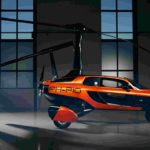British aerospace start-up Faradair plans to certify its 18-seat, hybrid electric ‘BEHA’ aircraft (Bio Electric Hybrid Aircraft) by 2025 for passenger operations.
The aircraft uses a design-patented ‘triple box-wing’ high-lift configuration, delivering Short Take-Off and Landing (STOL) capability requiring less than 300 metres of runway. Twin contra-rotating ‘propfans’ within a vectored thrust acoustic reduction duct improve efficiency and reduce noise to just 60dba at take-off.
After four years of development, including both simulated and scale model testing, the design has evolved into a configuration capable of carrying 18 passengers or three LD3 cargo containers, with an internal payload capability of five tonnes.
Watch our previous interview with Faradair’s Neil Cloughley.
London to Manchester in under an hour
The aircraft will be able to change configuration in 15 minutes from cargo to passenger, and vice versa, and the company says it is already in discussion with potential civilian and non-civilian customers around this capability.
The aircraft could fly from London to Manchester in just 42 minutes at a cruise speed of 230mph, the company says. The HS2 train would take 1 hour and 8 minutes.
Towards all-electric
Neil Cloughley, Managing Director of Faradair, said: “It’s been a rollercoaster, but days like today make it all worthwhile. Our Angel investors and families have kept us going when other projects have breezed through funding rounds, but we always knew the market would come back to us when people understood the economic viability of the aircraft design. So many of the constraints surrounding E-VTOL and UAM simply do not apply to our vehicle and that is why as a result, we will be able to deliver mass transit regional air mobility at a price that everyone can afford.”
He added: “We have always believed in the opportunity of hybrid propulsion to help reduce noise and operating costs in a specifically designed airframe optimised for regional flight capability, based on our management team’s experience of the commercial aircraft market. The BEHA M1H variant, multi-role aircraft, will allow operators the ability to provide viable air transport services including scheduled commuting flights, flight training and charter by day and the ability to use the quiet flight characteristics and payload capability for cargo operations at night.
“This opens market opportunities not served by existing aircraft, due to the lower noise signature and load capability. Our hybrid propulsion system mixes the proven capability of existing turboprop engines which could be run on biofuel if desired, with the fuel saving and increased safety opportunity of additional electric propulsion”
Faradair also intends to offer a fully electric-powered variant of the BEHA in due course, as battery technology evolves.

